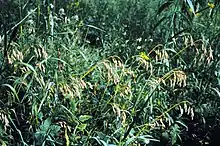| Bromus kalmii | |
|---|---|
 | |
| Scientific classification | |
| Kingdom: | Plantae |
| Clade: | Tracheophytes |
| Clade: | Angiosperms |
| Clade: | Monocots |
| Clade: | Commelinids |
| Order: | Poales |
| Family: | Poaceae |
| Subfamily: | Pooideae |
| Genus: | Bromus |
| Species: | B. kalmii |
| Binomial name | |
| Bromus kalmii | |
| Synonyms | |
|
Bromopsis kalmii (A.Gray) Holub | |
Bromus kalmii, Kalm's brome, is a species of brome grass. It is a native bunchgrass in the North-central and Northeastern United States, the Great Lakes region, and eastern Canada. The specific epithet kalmii refers to its discoverer Pehr Kalm.
Description
Bromus kalmii is a perennial grass, with solitary or slightly tufted culms that grow 0.4–1.2 m (1 ft 4 in – 3 ft 11 in) tall. The culms are pubescent just below the nodes. The grass typically has three to five and occasionally six leaf blades. The firm and scabrous leaf blades are either pubescent or glabrous and are 7–17 cm (2.8–6.7 in) long and 4–10 mm (0.16–0.39 in) wide. The glabrous or sometimes shaggy sheaths are mostly shorter than the internodes and each have a V-shaped cleft. The ligule is typically 0.5 mm (0.020 in) long. The narrow, crowded panicle is 5–15 cm (2.0–5.9 in) long. The lower branches of the panicle are very slender and each bear one or two spikelets. The five to eleven flowered spikelets are 1.4–2.6 cm (0.55–1.02 in) long and 5–6 mm (0.20–0.24 in) wide. Both glumes have short, adpressed hairs. The lower glume is three-nerved and the upper glume is five-nerved. The densely hairy lemmas are oblong to elliptical in shape, and have straight awns 1–3 mm (0.039–0.118 in) long. The oblong and flat palea is slightly shorter than the glume. The anthers are approximately 2 mm (0.079 in) long.[2][3]
The grass flowers from July to through August.[4]
Habitat
Bromus kalmii grows in dry or moist open areas or thickets, especially on calcareous soils.[2][5]
References
- ↑ Bromus kalmii was first described and published in A Manual of the botany of the Northern United States: from New England to Wisconsin and south to Ohio and Pennsylvania inclusive, (the mosses and liverworts by Wm. S. Sullivant,) arranged according to the natural system. 1st Edition. 600. 1848. Boston; London. The synonym Bromopsis kalmii was published in Folia Geobotanica & Phytotaxonomica 8: 167. 1973. Prague. "Bromus kalmii". International Plant Names Index (IPNI). Royal Botanic Gardens, Kew; Harvard University Herbaria & Libraries; Australian National Botanic Gardens. Retrieved August 9, 2010.
- 1 2 Merrit Lyndon Fernald (1970). R. C. Rollins (ed.). Gray's Manual of Botany (Eighth (Centennial) - Illustrated ed.). D. Van Nostrand Company. p. 101. ISBN 0-442-22250-5.
- ↑ United States Division of Agrostology (1900). Bulletin. U.S. Government Printing Office.
- ↑ Nathaniel Lord Britton, Addison Brown (1913). An Illustrated Flora of the Northern United States, Canada and the British Possessions. Vol. 1 (2 ed.). Charles Scribner's Sons. p. 266.
- ↑ Illinois Wildflowers